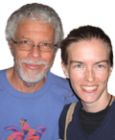
Fear
Fear of Success
Fear of success is simply fear of failure, one step removed.
Posted June 11, 2009
In any sport, there are athletes who never live up to their potential. Sometimes it's because of injuries. Sometimes, people just aren't really motivated. They're going through the motions, but not really putting in the training, practice, or hard emotional and physical work of preparing themselves for peak performance.
At one level, there's nothing wrong with that for recreational athletes. We do our sports because they're fun. Hobbies, not highly paid jobs, with people depending on us to produce results. But sometimes we really want to do better . . . truly know we could do better . . . and can't seem to make it happen.
Lots of things may be defeating us, but one of the more insidious is fear of success.
That's right: fear of actually doing that which we claim we want to do. You can see this in any sport (or in business or day-to-day life, for that matter) but it shows up most clearly in running, bicycling, or triathlons. Some folks - quite a few, in fact - are afraid to give their all to a race because they're afraid of what might happen if they actually do succeed. It's like being afraid of falling in love for fear of being hurt. People who suffer from it may race frequently, but they'll do every race very conservatively, never really showing themselves - or anyone else - what they can actually do.
The underlying fear isn't really of success, but of the consequences of success. In other words, says Faulder Colby, a clinical psychologist and two-time marathoner, fear of success is simply fear of failure one step removed. What happens if you can't actually duplicate your breakthrough?
Bob Williams, a Portland, Oregon coach who trains athletes on the same track that we use, notes that that beginning runners are often shocked the first time they run a good race. Their reaction, he says, is "Ohmygod, I can't believe I did that!" And given the realities of racing, nobody can promise that your next race will be equally good. In 1967, Williams himself ran one of the great races of his life to win the Pac-8 steeplechase (the Pac-8 was the predecessor to today's Pac-10 conference). "I feared the national championships because I didn't think I could run that well again," he admits.
Williams ran all-out in both races. But some athletes make sure they never perform so well that they aren't sure of being able to do it again. Our friend Nancy (not her real name) is an excellent case in point. Over the years, she's convinced most of the people in our running club that she's hopelessly slow. But once, she horrified herself by accidentally uncorking an extremely fast run. "Don't tell anyone about it," she said afterward, "or they'll all expect me to do it again."
If this is you, don't despair. Like many fears, this one can often be licked, with a bit of work.
Begin by ridding yourself of the need to succeed in that second race. Ask yourself what's the source of that pressure. If it's external, tell friends, family, and other would-be coaches that their attempted cheerleading is putting you under unneeded pressure. Keep your race results secret from those who can't respect your desire not to be overly pushed.
If the pressure's internal, try reversing the action-movie cliché and telling yourself that failure is an option, that the world won't end if you don't run a great race second time around. In fact, failure is a normal part of any sport, and discovering what doesn't work is often more valuable than finding out what does. "You can't really learn until you fail," says Williams.
Other suggestions:
• Remind yourself that all sports careers have ups and downs.
• Take an incremental approach. Try speeding up just a little bit in your next race. You've advanced, but not by a frightening amount, and even if your next race doesn't duplicate that advance, you're not risking a lot. Do this enough times, and you'll eventually be running at your maximum, but you'll have done it gradually enough to have a good chance of keeping the fear under control.

